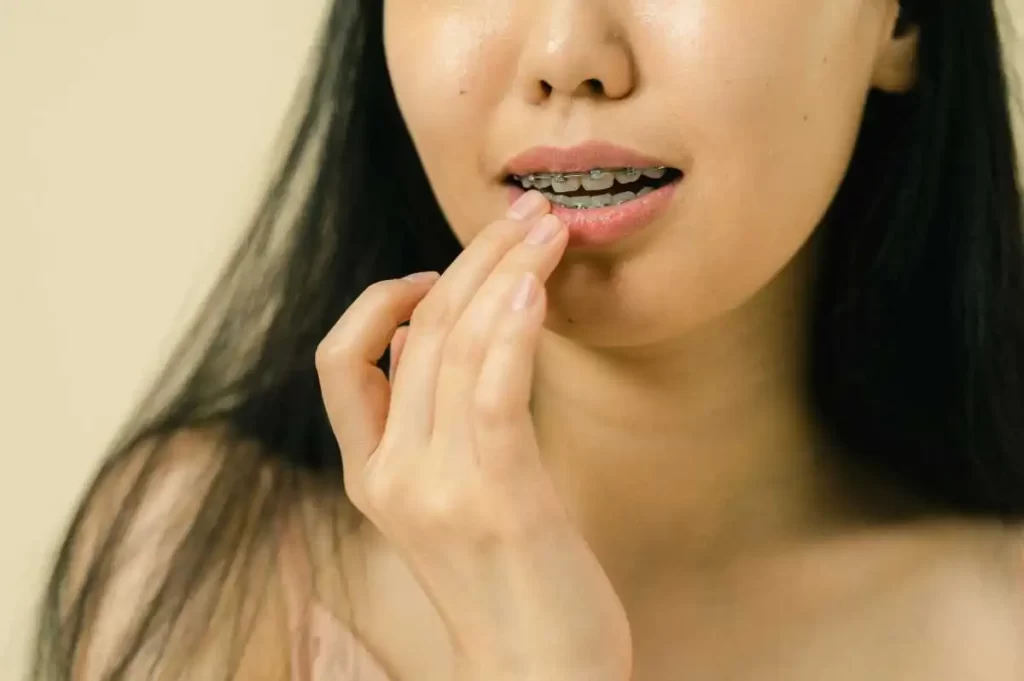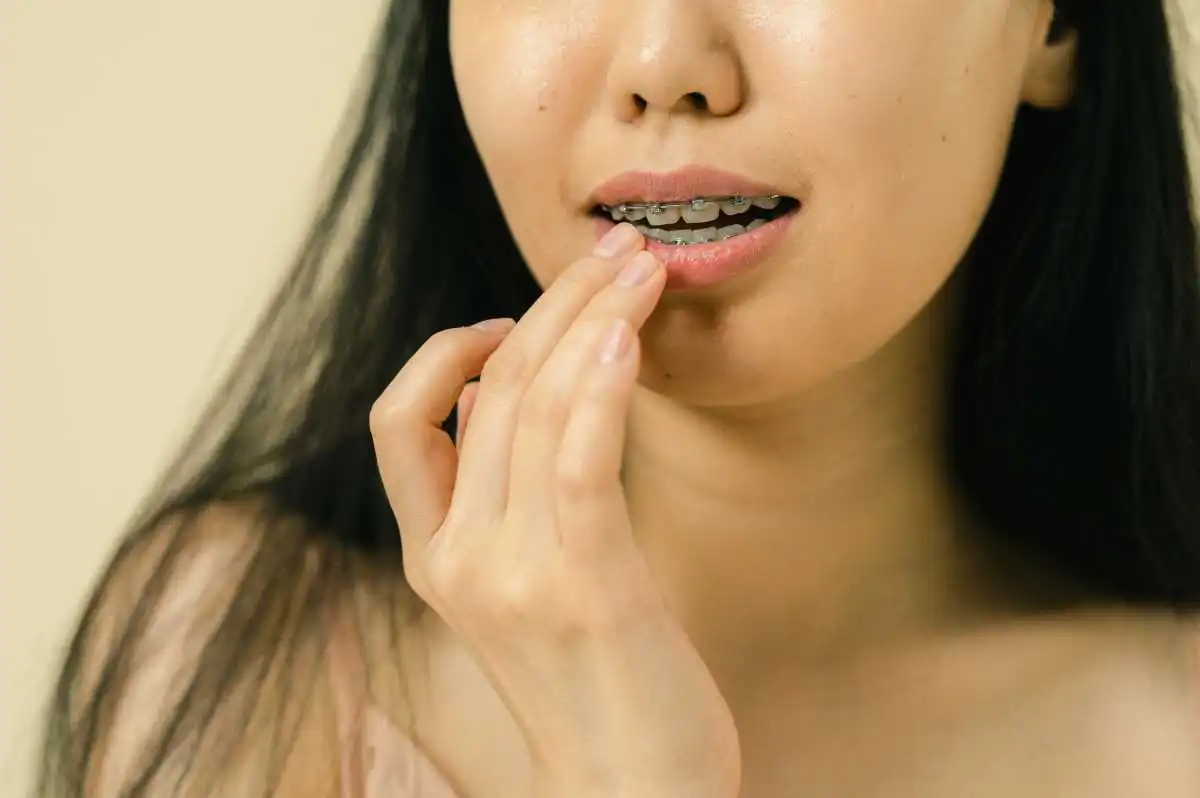Welcome, dear readers, to another insightful journey into the world of dental health.
Today, we delve into a question that often circulates among those considering orthodontic treatment: “Do braces make your teeth loose?”
This concern is a natural one, as the idea of having braces can be accompanied by various myths and misconceptions.
In this blog post, we will explore the intricacies of braces, their impact on your teeth, and why this concern might be more of a myth than a reality.

Table of Contents
Basic Knowledge of Braces:
Before we dive into the main question, let’s understand the fundamental purpose of braces.
Braces are orthodontic appliances designed to align and straighten teeth, correct bite issues, and enhance overall dental health.
They consist of brackets attached to each tooth, connected by wires and sometimes bands. The pressure exerted by the braces gradually guides the teeth into their desired positions over time.
Read: Can Braces Make Your Teeth Fall Out? (7 Reasons).
The Orthodontic Process:
To appreciate the impact of braces on your teeth, it’s essential to grasp the orthodontic process. The initial phase involves the application of braces, where the brackets are attached to the teeth.
As the treatment progresses, adjustments are made to the wires to maintain the optimal pressure for tooth movement.
This controlled force is crucial for repositioning the teeth while allowing the surrounding bone to adapt and support the changes.
Read: Can You Use Mouthwash with Braces?
Common Concerns about Braces:
Patients often express concerns about various aspects of orthodontic treatment, and one prevailing worry is the fear of teeth becoming loose.
This concern is rooted in the misconception that braces weaken the teeth, making them more susceptible to mobility or even loss.
Let’s address this apprehension head-on and explore whether there is any truth to it.
Do Braces Make Your Teeth Loose?
The short answer is no, braces do not make your teeth loose in the sense of jeopardizing their stability or causing tooth loss.
The perceived looseness during orthodontic treatment is a normal and expected part of the process. Let’s break down the reasons behind this sensation:
- Orthodontic Movement: When braces are applied, the pressure they exert on the teeth initiates a controlled movement. This movement is necessary for repositioning the teeth and aligning them properly. As a result, it is not uncommon for individuals to feel a slight sense of looseness in their teeth.
- Bone Remodeling: The bone surrounding the teeth plays a crucial role in orthodontic treatment. As the teeth shift, the bone undergoes a remodeling process to accommodate these changes. This remodeling might give the impression of tooth mobility, but it is a natural and necessary adaptation.
- Periodontal Ligaments: The periodontal ligaments, which connect the teeth to the jawbone, also experience changes during orthodontic treatment. As the teeth move, these ligaments stretch and adjust, contributing to the sensation of looseness.
- Temporary Nature: Importantly, any perceived looseness is temporary and part of the orthodontic process. Once the treatment is complete and the teeth have settled into their new positions, this sensation dissipates.
Read: 6 Reasons Why Your Teeth Popping with Braces.
Addressing Specific Concerns:
To provide a more in-depth understanding, let’s address specific concerns related to the myth of braces making teeth loose:
- Tooth Loss: The fear of losing teeth due to braces is unfounded. Orthodontic treatment is designed to improve dental health and function, and modern orthodontic techniques prioritize the preservation of teeth.
- Root Resorption: Some individuals worry about root resorption, a condition where the roots of the teeth shorten. While root resorption can occur in rare cases, it is typically minimal and monitored closely by orthodontic professionals. Advances in technology and treatment protocols aim to minimize the risk of significant root resorption.
- Maintaining Oral Hygiene: Proper oral hygiene practices are essential during orthodontic treatment. Patients must diligently brush and floss their teeth, ensuring that braces do not become a breeding ground for plaque and bacteria. Maintaining good oral hygiene helps prevent issues that could potentially affect tooth stability.
Who Should Avoid Braces?
While braces are a highly effective and widely used orthodontic treatment, there are certain situations where individuals might need to explore alternative options or delay the initiation of braces.
It’s essential to assess individual circumstances to ensure the best possible outcome for oral health.
Here are some situations where caution or alternative treatments might be considered:
1. Severe Periodontal Disease:
Individuals with severe periodontal (gum) disease may need to address these issues before undergoing orthodontic treatment.
Healthy gums provide the necessary support for the teeth during the movement process, and addressing gum disease is crucial for successful orthodontic outcomes.
2. Uncontrolled Tooth Decay:
Braces involve attaching brackets to the teeth, and if there is extensive tooth decay, the compromised teeth may not be suitable for the additional stress placed by braces.
Prior to orthodontic treatment, any decay should be addressed through restorative procedures.
3. Unresolved Temporomandibular Joint (TMJ) Issues:
Temporomandibular joint disorders can lead to jaw pain, clicking, or other symptoms.
Before starting orthodontic treatment, individuals with unresolved TMJ issues should consult with both an orthodontic specialist and a dentist to ensure that the treatment plan accommodates these concerns.
4. Medical Conditions Affecting Treatment:
Certain medical conditions may affect the feasibility of braces.
Conditions that compromise the immune system or bone health, for example, might require careful consideration and collaboration between the orthodontic specialist and other healthcare professionals.
5. Insufficient Oral Hygiene Practices:
Maintaining excellent oral hygiene is crucial during orthodontic treatment.
Individuals who struggle with consistent oral care or have a history of poor dental hygiene may need additional education and support before embarking on braces treatment.
6. Age Considerations:
While braces can be effective for people of all ages, there may be optimal windows for treatment.
In some cases, children might need to wait until a sufficient number of permanent teeth have erupted before starting orthodontic treatment.
Conversely, in adults, certain dental issues might be better addressed through alternative treatments like Invisalign.
7. Financial Constraints:
Orthodontic treatment, including braces, can be a significant financial investment.
Individuals facing financial constraints should explore available options and discuss potential alternatives or payment plans with their orthodontic provider.
It’s crucial to note that the decision to avoid or delay braces is highly individualized and should be made in consultation with an experienced orthodontic professional.
A thorough examination, discussion of medical history, and consideration of individual needs and preferences will guide the treatment plan.
In situations where braces might not be the immediate solution, alternative orthodontic treatments, such as Invisalign, may be explored.
Ultimately, the goal is to ensure that individuals receive the most suitable and effective orthodontic care tailored to their unique circumstances.
Always consult with your orthodontic specialist to determine the best course of action for your oral health journey.
Conclusion
So, do braces make your teeth loose? No, it is just a myth. The sensation of looseness is a natural part of the orthodontic process, indicating that the braces are working as intended.
It’s crucial to trust the expertise of your orthodontic professional and follow their guidance throughout the treatment journey.
Orthodontic treatment, including the use of braces, is a transformative and positive experience for countless individuals seeking improved dental health and a confident smile.
By dispelling common myths and misconceptions, we empower ourselves to make informed decisions about our oral health.
Remember, if you are considering orthodontic treatment or have any concerns about your dental health, consult with a qualified orthodontic specialist who can provide personalized guidance based on your unique needs.
Embrace the journey to a straighter, healthier smile with confidence!

